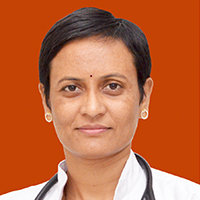

Successful Treatments
Clinics
Doctors
What is Diabetes?
Diabetes (commonly called Diabetes mellitus) is a health condition where the body struggles with high blood sugar levels over a long period. This happens because the pancreas does not produce sufficient insulin or the body cells don't respond to insulin correctly. Insulin is a hormone which helps glucose enter the body cells to be used for energy.
There are several types of Diabetes:
Type 1 Diabetes: This kind of Diabetes is an autoimmune condition where the immune system attacks the insulin producing cells in the pancreas. It is generally diagnosed in children and young adults. In type 1 Diabetes, the body creates very little or no insulin.
Type 2 Diabetes: The most common type of Diabetes, where the body doesn't utilise insulin properly, a condition called insulin resistance. The pancreas may make less insulin as the condition worsens. Type 2 Diabetes is generally seen in adults but could occur in children too.
Gestational Diabetes: This type occurs during pregnancy and in most cases clears after giving birth, but it can increase the risk of type 2 Diabetes for the mother.
Other types: Other types of Diabetes include Type 3c Diabetes caused by pancreatic damage from diseases such as pancreatitis, and other genetic forms such as Maturity-Onset Diabetes of the Young (MODY).
In Ayurveda, Diabetes is called Madhumeha and is thought to arise from an imbalance of the body’s energies, mainly the Kapha dosha. Ayurvedic treatment methods focus on dietary changes, herbal medicines and lifestyle changes to restore this balance.
The difference between Diabetes type 1 and 2 lies in their causes and how they impact the body. Type 1 Diabetes results primarily due to the body’s immune system destroying insulin making cells, whereas type 2 Diabetes is caused by insulin resistance, where the body's cells do not respond correctly to insulin. Both types of Diabetes require timely management to avoid further complications.
Common Causes of Diabetes
Diabetes occurs when there are issues with insulin production or effectiveness in the body, leading to a rise in blood sugar levels. Knowing what causes Diabetes may help with preventing and managing Diabetes effectively.
The following are the common causes of Diabetes:
Genetic Factors: Family history is important, particularly for type 1 and type 2 Diabetes. Having parents or siblings with Diabetes increases your chances of developing it.
Weight: Being obese or overweight raises your risk of type 2 Diabetes. Excessive body fat, particularly around the abdomen, might result in insulin resistance.
Physical Inactivity: Another risk factor for type 2 Diabetes is not getting enough physical exercise. Regular physical activity helps control weight, uses up glucose as energy and makes cells more sensitive to insulin.
Poor Diet: A diet rich in processed food and sugars can also raise the risk for type 2 Diabetes. Healthy eating habits help control blood sugar.
Age: The likelihood of developing type 2 Diabetes rises as we grow older and is much more common among older people. But it is now being diagnosed more frequently in children, younger adults and adolescents.
Hormonal Changes: Gestational Diabetes is caused by hormonal changes during pregnancy, which can cause insulin resistance. Women who develop this particular type of Diabetes are at a higher risk of developing type 2 Diabetes in the future.
Autoimmune Reaction: In type 1 Diabetes, the immune system mistakenly attacks and destroys insulin producing cells in the pancreas. The exact reason for this autoimmune reaction is still unknown.
Signs and Symptoms of Diabetes
Recognising the Diabetes symptoms is important for early detection and treatment. Timely intervention may prevent the Diabetes mellitus symptoms from turning into serious complications.
These are Diabetes symptoms that could suggest you have this condition:
Diabetes Symptoms
Increased Thirst & Urination
High blood sugar levels make it tougher for the kidneys to filter and absorb extra sugar, resulting in dehydration and a greater need to urinate than before.
Unusual Weight Loss
Even if you are eating and feel hungrier, you may experience sudden weight loss, often with type 1 Diabetes. This is due to loss of sugar and water in urine and the breakdown of muscle and fat.
Fatigue
You may feel unusually tired and lethargic when your cells lack sugar, their major energy source.
Blurred Vision
High blood sugar levels could pull fluid from your eye lenses, causing issues with focusing and blurred vision.
Slow Healing Sores or Cuts
With time, high blood sugar can restrict blood circulation and cause nerve damage, which makes it hard for your body to heal wounds.
Tingling/Numbness in Hands or Feet
This is called neuropathy and is caused by nerve damage from high blood sugar levels for a prolonged period of time.
Frequent Infections
Diabetes can impair the immune system and lead to frequent infections, generally of the skin or vaginal yeast infections in women.
Do you have any of the following symptoms?
- Increased thirst and urination
- Unexplained weight loss
- Feeling unusually tired or lethargic
- Blurred vision
- Slow healing sores or cuts
- Tingling or numbness in hands or feet
- Frequent infections
Jiva Ayunique™ Treatment Philosophy - A Holistic Approach to Diabetes
Jiva Ayurveda offers holistic Diabetes mellitus treatment using evidence-based Ayurveda. The treatment plans are customised to target the very root causes of the disease, and instead of just treating symptoms, they focus on holistic healing, balance and stability in totality for the management of Diabetes mellitus.
Core Principles of the Jiva Ayunique™ Treatment Philosophy
HACCP certified Ayurvedic medicines: These are scientific blends developed to rebalance the body’s energies and improve emotional health.
Yoga, Meditation and Mindfulness-Practices: Techniques for relaxation that promote mental health and overall wellness.
Ayurvedic Treatments: Therapies like Panchakarma and various therapeutic massages which detoxify the body and promote emotional balance.
Diet & Lifestyle Recommendations: Expert advice on making lifestyle and dietary adjustments for better health outcomes.
Ayurvedic Medicines for Diabetes
The traditional system of medicine in India, called Ayurveda, offers several natural remedies to manage the symptoms of Diabetes. These Ayurvedic herbs are used to control blood sugar and provide holistic health benefits.
Here are some Ayurvedic medicinal plants for Diabetes treatment:
Fenugreek (Methi): Fenugreek seeds have soluble fibre, which helps reduce blood sugar by slowing digestion and absorption of carbohydrates. This may help in controlling Diabetes.
Bitter Gourd (Karela): Bitter gourd is mostly used for its blood glucose lowering properties. It contains three anti-diabetic active substances, including charantin whose blood glucose lowering effect has been confirmed in various studies.
Gurmar (Gymnema Sylvestre): This herb helps to relieve sugar cravings and lowers blood sugar by stimulating enzyme activity that helps the cells in using glucose.
Sugar apple (Annona Squamosa): Known for its antihyperglycemic and hypoglycemic properties, the ethanolic leaf extract of this herb may help raise plasma insulin levels.
Davana (Artemisia Pallens): This herb exhibits hypoglycemic effects and helps increase peripheral glucose utilisation or inhibit glucose reabsorption.
Supari (Areca Catechu): Known for its hypoglycemic properties, it assists in blood sugar control.
Chukkander (Beta Vulgaris): It enhances glucose tolerance as demonstrated in many oral glucose tolerance tests.
Punarnava (Boerhavia Diffusa): It increases hexokinase activity, reduces glucose-6-phosphatase and fructose bisphosphatase activities and boosts blood plasma insulin levels.
Semul (Bombax Ceiba): It has hypoglycemic effects, which is useful for Diabetes management.
Palasa (Butea Monosperma): This herb is renowned in Ayurveda for its antihyperglycemic activity.
Camellia Sinensis: This herb is used for its anti-hyperglycemic activity and antioxidant action on rising blood sugar levels.
Karir/Pinju (Capparis Decidua): It provides hypoglycemic, antioxidative and hypolipidemic benefits.
Sagargota, Fevernut (Caesalpinia Bonducella): This Ayurvedic herb is known for its hypoglycemic qualities, as an insulin secretagogue and because of its hypolipidemic advantages.
Bimb/Kanturi (Coccinia Indica): This herb is believed to have hypoglycemic properties, beneficial in Diabetes patients.
Amla (Emblica Officinalis): Amla reduces lipid peroxidation, is a good antioxidant and has hypoglycemic effects.
Sakkargand (Ipomoea Batatas): It helps reduce insulin resistance, which is helpful in type 2 Diabetes management.
Kadavanchi (Momordica Cymbalaria): Kadavanchi is believed to offer hypolipidemic and hypoglycemic advantages.
Curry leaves (Murraya Koenigii): Curry leaves are known to show hypoglycemic effects, boost glycogen production and reduce gluconeogenesis & glycogenolysis.
Anar (Punica Granatum): Anar provides antihyperglycemic and antioxidant benefits for Diabetes patients.
Frequently Asked Questions About Diabetes
What does Ayurveda consider the cause of ?
Ayurveda considers Diabetes (Madhumeha) to be caused by lifestyle errors, dietary excesses and an imbalance of the Kapha dosha, resulting in impaired insulin function in the body.
Can Ayurveda cure Diabetes completely?
Ayurveda can help manage the symptoms of Diabetes and balance the body’s energies through dietary changes, lifestyle adjustments and herbal medicines.
How can Ayurveda help prevent Diabetes?
Ayurveda stresses on a healthy and balanced diet, herbal supplements and regular exercise to strengthen the body’s metabolism and manage blood glucose.
What lifestyle changes does Ayurveda suggest for managing Diabetes?
Ayurveda suggests regular physical activities like yoga, a healthy diet rich in fibre and avoiding excessive sweets and carbohydrates.
Can stress affect Diabetes & what does Ayurveda suggest for stress management?
Yes, stress can affect blood sugar levels in the body. Ayurveda suggests relaxing activities like meditation and yoga to reduce stress levels.
What Ayurvedic herbs are beneficial for Diabetes?
Common herbs include Gymnema Sylvestre, Cinnamon, Fenugreek and Bitter Gourd that help in lowering blood sugar.
Is there a diabetic diet chart prescribed by Ayurveda for diabetics?
Ayurveda prescribes bitter and astringent foods, whole cereals and green vegetables to manage blood sugar.
How does Ayurveda diagnose Diabetes?
Ayurveda diagnoses Diabetes based on symptoms, lifestyle and a thorough physical examination, often observing signs such as body constitution and urine qualities.
Are there any side effects of Ayurvedic medicine for Diabetes?
Ayurvedic remedies are generally safe, when used under the supervision of an Ayurvedic doctor but require regular monitoring to test compatibility with one’s conditions.
How long will it take to obtain results with Ayurvedic Diabetes treatment?
Results can vary; some improve within a few weeks and some take longer depending on individual health status and compliance with the treatment plan.
Can Ayurveda help with Diabetes-related complications?
Ayurveda can provide supportive therapy for managing complications such as neuropathy and retinopathy with targeted herbal treatments and lifestyle changes.
Top Ayurveda Doctors
Our Happy Patients
Blogs
- This World Diabetes Day ? Pledge to Fight Diabetes at the Root
- Five Early Signs of Diabetes
- 5 Foods That You Should Never Take in Diabetes
- Home-Remedies for Diabetes
- Simple Tips to Prevent Diabetes
- Adopt Ayurveda to Deal with Type 1 and 2 Diabetes
- Food Habits that Ayurveda recommends to diabetes patients
- Do?s and Don?ts to Manage Diabetes in Ayurvedic Lifestyle
- Managing Diabetes with Ayurveda
- Early Diabetes Symptom You Should Never Ignore
Home Remedies
Related Disease
- Ayurvedic Treatment for Obesity
- Thyroid Treatment In Ayurveda
- Ayurvedic Treatment for Diabetes
- Ayurvedic Treatment For Type 1 Diabetes
- Ayurvedic Treatment for Hypoglycemia
- Ayurvedic Treatment for Hyperglycemia
- Get Ayurvedic Treatment For Prediabetes
- Ayurvedic Treatment for Diabetic Neuropathy
- Ayurvedic Treatment for Gynecomastia
- Ayurvedic Treatment for Hernia
- Ayurvedic Treatment for Gangrene
- Ayurvedic Treatment for Weight Loss
Latest Blogs
- Ayurvedic Skincare Routine for Oily Skin: Natural Products + Regimen
- Your First Panchakarma Detox? Here's What to Expect Day by Day
- Can Ayurveda Help with Anxiety? Here’s What Patients Say
- 5 Signs Your Body Is Out of Balance - According to Ayurveda
- What Is My Dosha Type? This 3-Minute Guide Will Help You Figure It Out.
- What Ayurveda Says About Intermittent Fasting Dos and Donts
- Ayurvedic Insights on Gut Health Whats Trending in Wellness in 2025
- Immunity Boosting Tips for Post-Viral Fatigue Ayurvedic Expert Guide
- Top Ayurvedic Oils for Joint Pain Relief And How to Use Them Daily
- Natural Immunity Boosters for Kids: Ayurvedic Solutions That Work
- Why Your Sleep is Suffering and What Ayurveda Recommends
- Best Ayurvedic Teas to Detox Your Body This Monsoon
- Ayurvedic Medicine for Diabetes: What Works and What Doesn’t
- How to Use Ayurvedic Remedies for PCOS: A Complete Natural Guide
- I Lost 40 Kgs in 12 Months with Ayurveda No Gym, No Crash Diet
- Is Triphala Really Good for Digestion? Here's What Ayurveda Says
- Monsoon Hair Fall? Try These Ayurvedic Solutions Before Visiting a Dermatologist
- 7 Morning Habits Backed by Ayurveda to Boost Energy Naturally
- Why Ayurveda Is Gaining Global Popularity in 2025
- Ayurvedic Daily Routine (Dinacharya) to Balance Your Doshas
Ayurvedic Doctor In Top Cities
- Ayurvedic Doctors in Bangalore
- Ayurvedic Doctors in Pune
- Ayurvedic Doctors in Delhi
- Ayurvedic Doctors in Hyderabad
- Ayurvedic Doctors in Indore
- Ayurvedic Doctors in Mumbai
- Ayurvedic Doctors in Lucknow
- Ayurvedic Doctors in Kolkata
- Ayurvedic Doctors in Patna
- Ayurvedic Doctors in Vadodara
- Ayurvedic Doctors in Ahmedabad
- Ayurvedic Doctors in Chandigarh
- Ayurvedic Doctors in Gurugaon
- Ayurvedic Doctors in Jaipur
- Ayurvedic Doctors in Kanpur
- Ayurvedic Doctors in Noida
- Ayurvedic Doctors in Ranchi
- Ayurvedic Doctors in Bhopal
- Ayurvedic Doctors in Ludhiana
- Ayurvedic Doctors in Dehradun









































